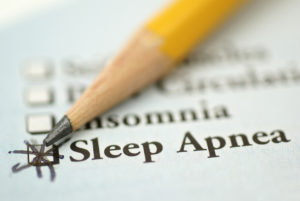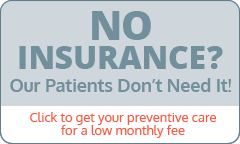Sleep Apnea – Dangers & Treatment Options From Your Dentist In Powell
February 17, 2017
 For the past few months, you’ve felt exhausted. Initially, you thought it was just stress from work and taking care of your aging parents, but your wife’s jokes about how much you’ve been snoring lately make you wonder if something else is causing your sleep troubles. When you talk with your doctor, she orders a sleep study and you finally have your answer: obstructive sleep apnea. Your doctor prescribes a CPAP machine, but the tubes make you feel restricted and self-conscious, and your sinuses are frequently congested. You know sleep apnea is too deadly to leave untreated, but CPAP is not for you. Are there any alternatives that work just as well as a machine? Wedgewood Dental, your dentist in Powell, provides effective relief for this sleep disorder with custom oral appliance therapy.
For the past few months, you’ve felt exhausted. Initially, you thought it was just stress from work and taking care of your aging parents, but your wife’s jokes about how much you’ve been snoring lately make you wonder if something else is causing your sleep troubles. When you talk with your doctor, she orders a sleep study and you finally have your answer: obstructive sleep apnea. Your doctor prescribes a CPAP machine, but the tubes make you feel restricted and self-conscious, and your sinuses are frequently congested. You know sleep apnea is too deadly to leave untreated, but CPAP is not for you. Are there any alternatives that work just as well as a machine? Wedgewood Dental, your dentist in Powell, provides effective relief for this sleep disorder with custom oral appliance therapy.
What Is Sleep Apnea?
Sleep apnea is one of the most common sleep disorders, and is second behind insomnia. The word apnea means “the temporary cessation of breathing.” This usually occurs because the tongue relaxes and slides against the back of the throat, blocking proper inhalation, and preventing you from breathing while you sleep.
Since breathing is one of the vital functions of life, and your body is smart enough to know it’s being starved of the oxygen it needs, your brain wakes up – causing micro-arousals. You wake up just enough to resume breathing correctly, but not enough to remember it. And, even though you may not know you’re waking up, you feel it in the morning – you’re constantly exhausted because you struggle to sleep deeply and still breathe properly.
While CPAP machines solve the problem of a relaxed tongue and throat, the constant air pressure can be uncomfortable for many patients. Thankfully, there are dental alternatives to expensive machines that don’t work for the people who need them.
Is Sleep Apnea That Dangerous?
You may be thinking, if my body is wise enough to wake up and make sure I keep breathing throughout the night, is sleep apnea treatment really necessary? Dr. Ryan Eskridge and Dr. Norman Straker caution not taking this serious condition lightly. Sleep apnea can cause many severe medical issues:
- Cardiac Arrest
- Sudden Death
- Stroke
- High Blood Pressure
- Car Accidents (from being sleepy behind the wheel)
- Shortened Life Span
- Diabetes
- Headaches
- Depression
- Worsened ADHD/ADD
- Exhaustion
How Can I Tell If I Have Sleep Apnea?
If you have trouble sleeping and wonder if you might have sleep apnea, you can take the following steps:
- Check the symptoms of sleep apnea.
- Evaluate your risks – and remember, even if you don’t snore, you could still have sleep apnea. Take this quiz to become familiar with this condition.
- Talk with our dentists or your doctor about having a sleep study done as soon as you can.
How Does Dental Sleep Apnea Treatment Work?
At our practice, Custom Oral Appliance Therapy (COAT) is the preferred treatment option for sleep apnea. Your 100% tailored device is similar to a mouthguard and will gently shift the lower jaw forward while you sleep – this will pull the tongue out of the way and allow you to breathe freely. Treatment is effective for the vast majority of patients – COAT works for about 80% of people we see.
So, if you suffer from sleep apnea and aren’t a fan of CPAP, you have other options to improve your sleep and lead a long, healthy life. Schedule your appointment today for sleep apnea therapy in Powell with the experts at Wedgewood Dental and sleep like a baby again.
No Comments
No comments yet.
RSS feed for comments on this post.
Sorry, the comment form is closed at this time.


